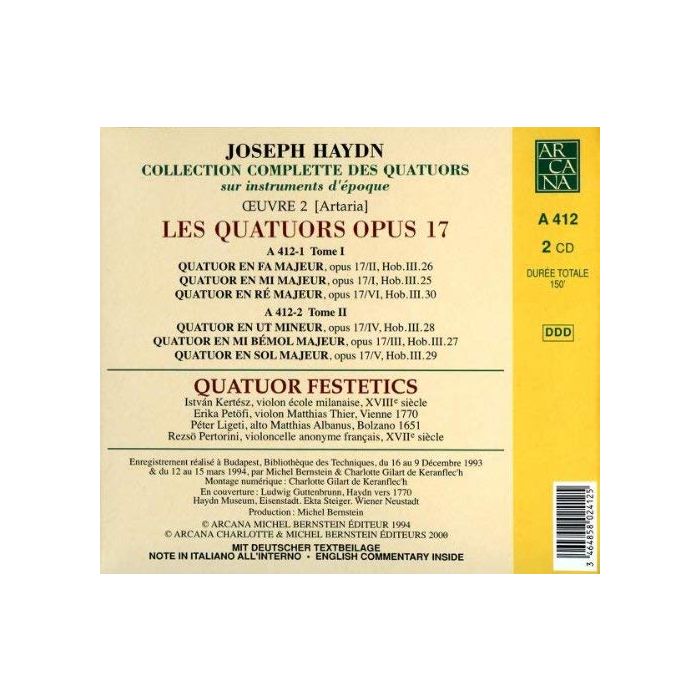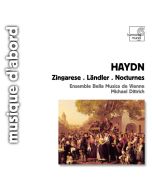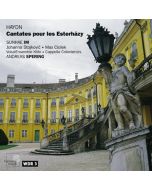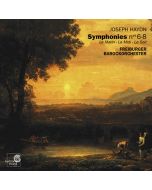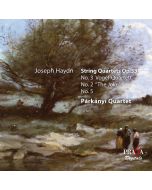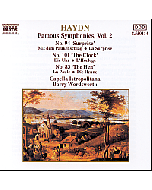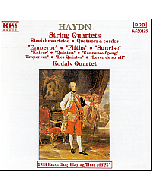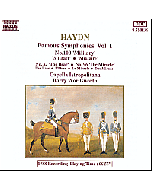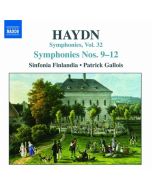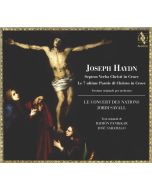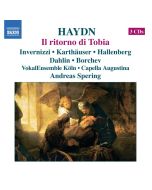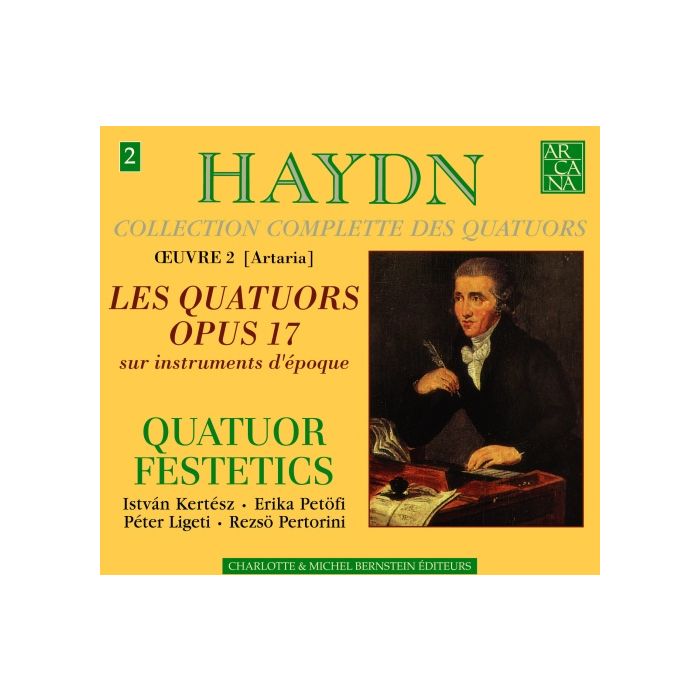
(Produkt nie został jeszcze oceniony)
kompozytor
Haydn, Joseph
tytuł
Haydn: Les Quatuors 9
wykonawcy
Quatuor Festetics
nr katalogowy
A 412
opis
COLLECTION COMPLETTE DES QUATUORS DE HAYDN according to the Artaria (Vienna) classification
Recording the complete cycle of Haydn Quartets is an undertaking that requires the complicity of time. In the enormous corpus left by the composer, his evolution and imagination make each quartet a unique work. Consequently, the project was attempted without first being able to determine its duration. It is exactly the kind of enterprise where one knows when it begins but has no idea of when it will be completed.
CLASSIFICATION
In old age, Haydn apparently wrote to Artaria that the series of his Quartets began with the six works that are now known as Opus 9. Artaria, the firm with which Haydn had the most dealings and to which he most often entrusted his works, was preparing its Collection Complette des Quatuors, and asked Haydn to oversee the revision. Relations between the composer and publisher “even though they had sometimes been strained, and although Haydn, preoccupied with his schillings, had occasionally been unfaithful“ had lasted since 1780, when Artaria’s princeps edition of the Opus 30 Piano Sonatas was published. From this Opus 30 up to Opus 85, one may restore a continuity “in spite of some repeats“ made up of original editions, reprints and a few rare transcriptions.
The usual classification of the Quartets follows the Pleyel edition. Ignace Pleyel had been Haydn’s student but, in the view of posterity, he appears to have been a savvy businessman, instrument builder, music publisher and composer of a considerable amount of Gebrauchsmusik (that his position as publisher easily enabled him to make profitable). Pleyel had not brought out a princeps editon of Haydn quartets, and his relations with his master were not of a spiritual or affective nature. Pleyel, not in the slightest troubled by the question of authenticity, published apocryphal quartets and based his classification on fanciful, irrational opus numbers. It is regrettable that this edition is generally used rather than Artaria’s, the latter benefiting, for the most part, from Haydn’s guarantee.
Eliminating the quartet version of the Seven Last Words and the youthful Fürnberg, Quartets that do not fall within the standard four-movement form beginning with the Opus 9, Artaria reduced the number of quartets from 83 to 58, all authentic, all accepted by Haydn. Following the encyclopedic spirit of the late 18th century, Artaria brought out the cycle in 14 volumes (Nos. 1 to 14, according to the chronological order of composition), of 3 or 6 quartets each (except for No. 5, which contains only the small isolated Quartet Opus 42).
The present recording is meant as a tribute to a firm that published most of Haydn’s and Mozart’s scores during their lifetimes, as well as a number of compositions by Beethoven. Although Artaria still exists, it had to give up all publishing business in 1926 due to its no longer being able to compete with enterprises that had become more powerful. We are therefore pleased to salute here the action of a music publisher that, to our eyes, remains one of the most strategic in history.
INTERPRETATION
The interpretation was entrusted to the FESTETICS QUARTET, a choice resulting from resolutely accepted options in the current state of interpretation.
• There could be no question of proposing romantic interpretations, for Haydn’s music is an intellectual construction, and his mastery of harmony in fact a highly elaborate language that excludes unchecked outpourings. The finesse of the trait, the liveliness of the interventions and the refinement of sonorities require an ensemble that has been nourished on the culture of the Age of Enlightenment. The force of expression comes from the firmness of the discourse, not from a turning in on oneself.
• For this reason, to our mind, an ensemble playing on period instruments seemed indispensable for rendering full justice to scores whose wealth of imagination seems to be the determining element. The use of modern or modernised instruments would exaggerate the line and weigh down the discourse, which would consequently lose its rhetorical quality and power of expression.
• Haydn was born near the Hungarian border, and several decades of his career took place on Hungarian soil. It is thus legitimate that that country consider the composer of The Creation as a native son. In addition, Haydn was quite interested in Slavic and Hungarian folk themes, and it is in that small, multicultural corner of Europe that the correct rhythm of these folk-flavoured movements is perceived most naturally. The Hungarian performers show a greater aptitude for idiomatic expression than those who, even of equal quality, come from other types of culture.
• Trained at the same school and all residing in Budapest, the members of the FESTECTICS QUARTET enjoy possibilities for working together that are unknown to those international groups formed according to the vagaries of encounters, coming together for a few weeks out of the year to honour engagements. Furthermore, the FESTETICS QUARTET profits from the support of Lazlo Somfai, one of the greatest living Haydn specialists.
It thus seems that the FESTETICS QUARTET was predestined to interpret Haydn under idiomatic, historical and expressive conditions. I will add that the musicians’ instrumental qualities are remarkable, that the middle parts are not relegated to the background as is often the case “listen to the viola’s counter melodies“ and that, by placing the second violin to the right, on the same level as the first, the FESTETICS QUARTET restores the original arrangement, accentuates the clarity, restores balance and enlarges the sound space.
MICHEL BERNSTEIN
nośnik
CD x 2
wydawca
Arcana
data wydania
16.12.2011
EAN / kod kreskowy
3464858024125
79,00 zł
Produkt dostepny w niewielkiej ilości.
Wysyłka w ciągu 3 dni roboczych
Darmowa wysyłka dla zamówień powyżej 300 zł!
Darmowy kurier dla zamówień powyżej 500 zł!
sprawdź koszty wysyłki